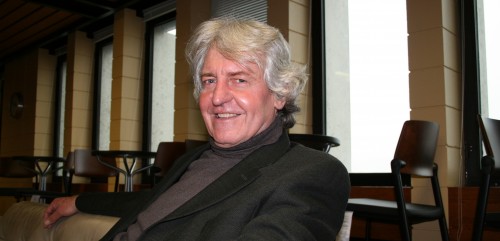Telling stories in school
The tradition and value of storytelling in various cultures is widely recognized but one U of S professor has been considering how storytelling can enrich teaching and learning in a university setting for both instructors and students.
By Kris Foster Although he has been a university teacher for nearly 40 years, and was a high school teacher before that, Howard Woodhouse, professor of educational foundations in the College of Education, said it is relatively recently that he has come to recognize "what we do as teachers is a process of story- telling." Encouraged by discussions with Aboriginal colleagues, Woodhouse has focused his research on exploring the notion of storytelling in the classroom. The result is a number of articles, including one published in the Journal of Educational Thought. In it, and in a recent interview with
Although he has been a university teacher for nearly 40 years, and was a high school teacher before that, Howard Woodhouse, professor of educational foundations in the College of Education, said it is relatively recently that he has come to recognize "what we do as teachers is a process of story- telling." Encouraged by discussions with Aboriginal colleagues, Woodhouse has focused his research on exploring the notion of storytelling in the classroom. The result is a number of articles, including one published in the Journal of Educational Thought. In it, and in a recent interview with On Campus News, Woodhouse described how storytelling can strengthen students' comprehension and appreciation of what they learn, fire their imaginations and create important connections between students and instructors.
Storytelling takes place on at least two levels, he said. One is when educators tell stories about the subject matter—its history, the characters involved and their various flaws, how the discipline came to be and how it may address the status quo. This form of storytelling "does, in general, bring the subject matter alive." Telling students about the people involved and "the fact that they're human beings and that they're fallible, they make mistakes, is very important. For most students, they would probably like that and some, for whatever reason … actually identify with something in the story."
The second level he described is educators telling stories about their own experiences, "the ways in which we have come to understand the world, come to understand the subject matter we teach, the ways in which we've come to feel passionate about that subject matter, the reason it's important to us, and the problems we may have had actually learning.
"I think with regard to both those levels … our goal in storytelling is to appeal to the imagination of our students so that they can imagine themselves telling stories about their subject matter, so they see themselves as agents, as actively engaged in the process of disseminating knowledge."
Imagination, he continued, is absolutely essential in both the creation and dissemination of knowledge.
While it is one thing to relate the history of a subject, it is quite another for a teacher to tell personal stories, "and I don't think there's any one recipe for this," said Woodhouse. "It varies from instructor to instructor, and is just one way of understanding the process of teaching and learning."
The storytelling could happen in the context of a lecture, a seminar or in simple dialogue, and Woodhouse believes it is a skill that can be learned. "Some people find it very difficult to talk about themselves; it's a question of confidence. As a general rule of thumb, it might be a good idea to start talking about other things before talking about oneself but everybody's got a story to tell … and I believe those stories are more interesting than people think."
Woodhouse said his stories often relate to music, the music he plays in class or even tales about his membership in a band. Music is a very powerful medium, he said, but so is art, day-to-day life or humour. "Again, I don't think there's any one recipe," but while the story might not always connect directly to a lecture, it almost always creates a personal connection with students.
There is, however, one important proviso to storytelling. "I think as faculty members we should do everything we can to tell true stories, not true in an absolute sense but as true as is possible because I don't think that the pedagogical relationship—the relationship between teacher and students—is going to be worth very much unless it's based on honesty, at least on the part of the teacher. And that goes for the stories we tell."
At the same time, while educators can never be sure students' stories relayed in class or in their writings are true, "if we don't tell the truth, we can't really expect them to. And students are pretty good at sniffing out whether someone's being honest or not."
The notion of storytelling may not appeal to everyone, he said, and it is something that does not always come easily but "I think that across campus … there are people who try to use this way of coming across to students as more than just a talking head."
Where his research will lead is something Woodhouse is "still trying to puzzle out." He has given a number of talks about his work and will continue to share his ideas on the U of S campus. He can also foresee his research developing into a book "and I hope that will happen because I think I have something to contribute to the importance of storytelling in pedagogy, and in research too.

